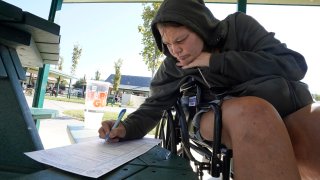
As the number of people without housing continues to rise in many California cities, Sacramento County’s elections agency is working to try to make sure those experiencing homelessness have a say in the electoral process by registering them to vote.
For the first time since the pandemic began, staff from Sacramento County’s elections agency set up tables Thursday at Loaves and Fishes, a nonprofit that provides services for homeless people, to resume an initiative that launched a few years ago. They registered 13 people to vote and plan to register more at Loaves and Fishes next week, said county elections spokesperson Janna Haynes.
“I would certainly hope that other counties are taking the same steps that we are to make sure that unhoused people have a voice, because there is a lot of things at least on our ballot that do affect them personally,” Haynes said. “It would be nice if they had a voice in things that are going to impact their daily lives.”
From Seattle to Phoenix, homelessness surged in many U.S. cities during the pandemic. In Sacramento alone, the homeless population grew 68% from 2020 to 2022 and now stands at 9,300 in the city of roughly 500,000. Housing shortages, the rising cost of rent, and the pandemic’s economic impacts continue to drive up the number of people experiencing homelessness.
Get top local stories in Southern California delivered to you every morning. >Sign up for NBC LA's News Headlines newsletter.
While nongovernmental organizations such as the advocacy group Housing is a Human Right help homeless people register to vote, it’s uncommon for an initiative like this to come from a county elections agency.
In 2016, then-Gov. Jerry Brown, a Democrat, signed into law the Voter’s Choice Act, which expanded mail-in voting and ballot drop-off locations. Homeless voters can receive ballots at a P.O. box, shelter, or a family member’s household. Voters in the county can also vote in person from Oct. 29 through Election Day.
Earlier Thursday, Elisha McDonald, who’s been without a home since February, was unsure whether she would register to vote. The mother of three is frustrated by unfulfilled promises made by public officials to address homelessness. But she ultimately decided to take a chance.
“Maybe we’ll get real change,” McDonald said.
For Texas native Donald Miller, Thursday was the first time he registered to vote. Miller, who has lived in Sacramento for about five years, echoed McDonald’s statements about politicians making unfulfilled promises to address homelessness. Still, he hopes something changes so that families can be confident that they won’t have to live on the streets.
“I felt like my voice needed to be heard,” he said, sporting a blue Golden State Warriors jersey.
Donald Whitehead, executive director of the National Coalition for the Homeless, hadn’t heard of county elections staff specifically targeting homeless people to register to vote. He’d also like to see more vote centers placed at shelters and libraries to make voting more accessible to people without housing.
Whitehead referred to voting as “the most powerful tool” for people without wealth to have a say in issues affecting their communities.
“Everybody, regardless of their financial status, should have the ability to do that,” he said. “But there are many, many barriers people experiencing homelessness have to face on a daily basis, and those barriers have prevented them from being part of the electoral process.”
In Los Angeles County, election officials help register people to vote at libraries, reaching those experiencing homelessness at a place many frequent, said Sara Gonzalez, project coordinator with the city’s elections division.
“When it comes to any group, going to where the people already are is half the battle,” Gonzalez said.
Haynes said Sacramento County plans to expand its outreach by setting up tables at more places that serve as community hubs for people without homes.
There are about 550 identified registered voters without housing in the county, “a drop in the bucket in comparison to how many people we know are unhoused,” she said.



